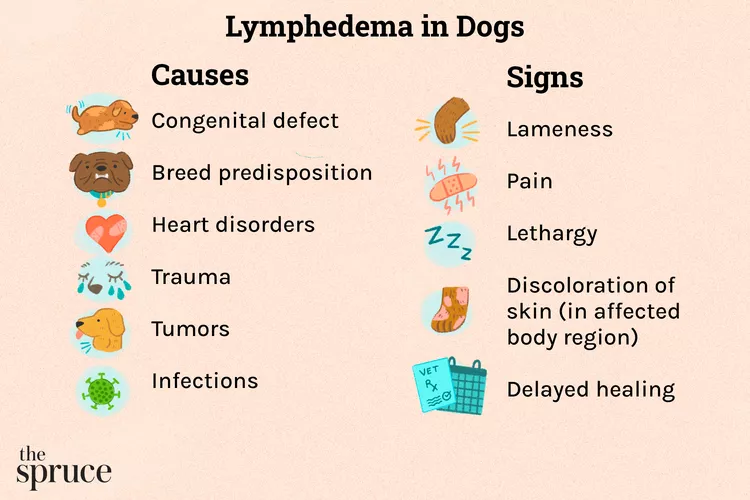Lymphedema in Dogs

Lymphedema is a medical condition in which localized fluid retention and tissue swelling are caused by a compromised lymphatic system. The swelling may affect one or more limbs and typically begins at the end of the limb, slowly moving toward the torso. Most of the time, the cause of a dog's lymphedema is an illness or injury. Stings from insects or snake bites are common causes of lymphedema, which can affect all dog breeds and ages. Primary lymphedema, a congenital issue, is more common in certain breeds and generally appears early in a puppy's life.
What Is Lymphedema?
Lymphedema is a collection of lymph fluid in body tissues due to obstruction within a dog's lymphatic system. This system filters blood, circulates lymph, and drains excess fluid from tissues. Lymphedema essentially refers to swelling in one or more parts of a dog's body that is caused by a problem within the lymphatic vessels.
Symptoms of Lymphedema in Dogs
Swelling is an obvious sign of lymphedema. While other injuries may cause tissue swelling, this condition happens as a result of lymphatic fluid pooling in parts of a dog's body.
The areas of swelling generally feel soft and malleable because they are fluid-filled—almost like a water balloon. In addition to visible swelling, the dog may begin to exhibit other symptoms that are caused by fluid retention in the swollen limbs such as pain or lameness of one or more limbs and lethargy due to generally feeling unwell.
Causes of Lymphedema
Lymphedema is most often a secondary condition resulting from a chronic illness or an acute injury such as:
- Heart disorders
- Injury
- Trauma (surgery or radiation therapy)
- Tumors/Cancer
- Insect stings/Snake bites
- Infections
- Surgery
These problems can cause excessive fluid production that overwhelms the lymphatic drainage system and creates swelling.
More rarely, lymphedema can be a primary problem that appears in puppies under two months of age due to a congenital defect in which normal lymph vessels are absent or compromised.
Lymphedema can occur in any dog, but the breeds that are more predisposed to the primary condition are Borzoi, bulldogs, poodles, Labrador retrievers, German shorthaired pointers, and English sheepdogs.
Diagnosing Lymphedema in Dogs
Your veterinarian will start by performing a thorough exam and obtaining a history of your dog. When giving the history of your dog, be sure to include any possible injuries or interactions with insects and snakes that may have recently occurred.
Your vet will most likely perform several diagnostic tests to explore common causes of tissue swelling such as injury, heart disease, or infection. Tests will most likely include a complete blood count, tests for tick-borne infections and heartworm disease, evaluations of liver, kidney, and pancreatic functions, electrolyte tests to check for dehydration, and a fine needle aspirate of the affected area or nearby lymph nodes.
A fine-needle aspiration (FNA) may be performed by collecting cells from an affected area or lymph node and then transferring them to a slide to look at under the microscope. It is minimally invasive and can be done on the same day as your initial exam. If the FNA is inconclusive or reveals no cancerous or inflammatory cells, x-rays or an ultrasound may also be recommended.
If primary lymphedema is suspected, lymphangiography may be considered. In this procedure, dye is injected below the swollen areas, and the flow is observed through video X-rays (fluoroscopy) to reveal areas of poor circulation.
Treatment and Prevention
If your vet finds an underlying cause of your dog's lymphedema that is treatable, then lymphatic swelling will resolve with treatment. Resting the dog and massaging the affected limb may improve lymph circulation.
In some cases of primary lymphedema, the use of long-term pressure wraps and physical therapy can help improve a dog's quality of life. Surgery may also be recommended, based on the results of lymphangiography.
Prevention of lymphedema is only possible in cases that involve injury or encounters with stinging insects or snakes. Even then, accidents can happen, and lymphedema may occur.
Prognosis for Dogs With Lymphedema
If the underlying cause of lymphedema is found and treated, the condition will likely resolve when the underlying problem improves. Prognoses for primary lymphedema are more variable and guarded, and severe cases can be fatal.
Types of Lymphedema in Dogs
- Primary lymphedema is lymphatic swelling that appears in puppies under two months of age due to a congenital defect in the lymph system.
- Secondary lymphedema is lymphatic swelling due to an injury or underlying illness.